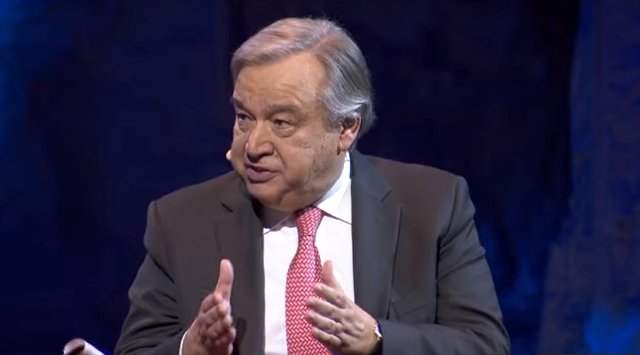Former Portuguese P.M. Antonio Guterres to be U.N. Secretary General
Many advocacy groups looked to see a woman in the United Nations’ highest office, and there was no shortage of female contenders – seven of the 13 candidates were women – but in the end, Guterres won out. Women make up an increasing portion of the U.N. staff; 34.8 percent of the secretariat staff are women. Photo from https://www.youtube.com/watch?v=potB0voQzNg.
October 25, 2016
On Thursday, Oct. 6, the 15 members of the United Nations Security Council met in New York City and agreed that former Portuguese Prime Minister and former head of the U.N. High Commission for Refugees, Antonio Guterres, should succeed Ban-Ki-moon as the U.N. Secretary General. The choice was reaffirmed by the 193-member General Assembly on Oct. 13. Guterres’ experience of dealing with refugees made him a valuable pick for the office.
The consensus comes as a surprise as it was expected that the Russian government would push for Irina Bokova, a Bulgarian politician and the Director-General of the United Nations Educational, Scientific and Cultural Organization (UNESCO). However, when Bulgaria itself decided not to support Bokova, it was clear that Russia could no longer push for its favored candidate. There was also a significant desire to have a woman holding the office, and while many of the candidates were women, none of them were accepted for the position. The United Nations has yet to have a female General Secretary, a trend which to the disappointment of advocates, will not be broken come January.
Guterres has had experience with refugees, having served as the High Commissioner for Refugees before. This experience is valuable in a time when the Syrian refugee crisis is heightening concerns about terrorism and causing backlash in many European countries. Guterres will have to reconcile the increasing tensions between the United States and Russia, work to resolve the civil war in Syria, manage the refugee crisis, continue to tackle the issue of climate change, and in addition, deal with various other crises around the world, including the fallout from Hurricane Matthew in Haiti and the growing backlash against globalization.
On New Year’s Day, Guterres will replace Ban Ki-moon, who pushed through two landmark initiatives: the Sustainable Development Goals for addressing poverty and the Paris Climate Agreement. If he wishes to continue challenging climate change, Guterres will have to work with countries around the world to build upon the Paris Agreement. The extent to which the U.N. will be able to tackle climate change during Guterres’ term will be strongly decided by the willingness of member states to cooperate; for example, the outcome of the United States presidential election this November will have large ripple effects on whether or not the world’s largest economy will work to fight climate change or back away on climate legislation.




